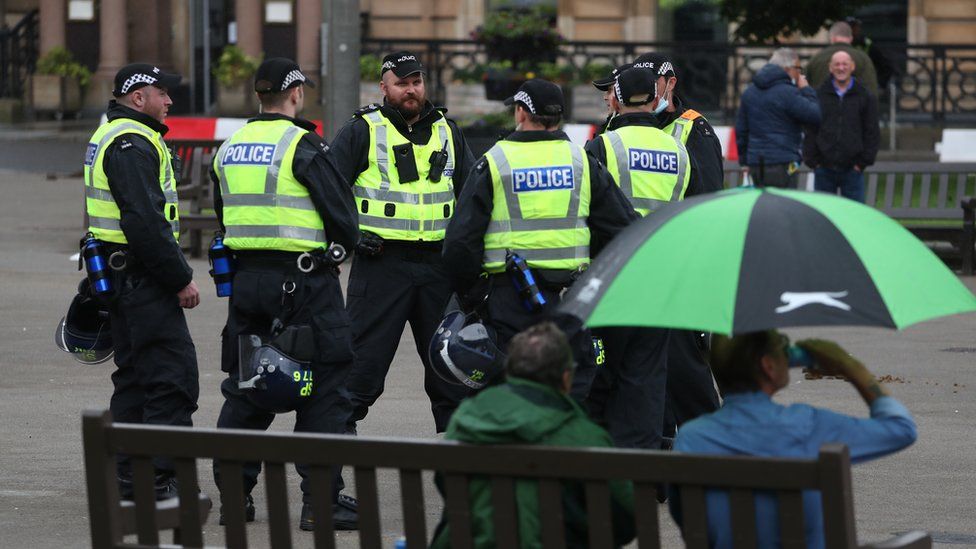New Scottish hate crime laws 'could devastate legitimacy of police'
- Published

The Scottish government's plans for new hate crime laws could "devastate the legitimacy of the police", a group representing officers has claimed.
Ministers say the Hate Crime Bill will offer greater protection for victims at a time when offences are on the rise.
But the Scottish Police Federation said it would see officers "policing speech" and harm relations with the public.
The Law Society of Scotland has also said a "lack of clarity" in the bill "could threaten freedom of expression".
Justice Secretary Humza Yousaf said the government was "absolutely explicit" that freedom of expression was not under attack, and was committed to "ensuring Scotland is a place where there is zero tolerance of hate crime".
Official figures released in June suggested that all categories of hate crime in Scotland were on the rise.
The Hate Crime and Public Order (Scotland) Bill aims to update the "fragmented" patchwork of laws covering this area, and would extend it by creating new offences relating to "stirring up hatred" in relation to age, disability, religion, sexual orientation, transgender identity and race.
Ministers say the bill will "send a strong message to victims, perpetrators, communities and wider society that offences motivated by prejudice will be treated seriously and will not be tolerated".
Holyrood's justice committee is currently scrutinising the proposals, and is gathering submissions from a range of groups.
The Scottish Police Federation, which represents 98% of officers, warned that the bill "could lead to police officers determining free speech and thereby devastate the legitimacy of the police service".
The federation said it could cause "a significant increase in police workload and demand", complicating the law with new rules which are "too vague to be implemented".
It also said the timing of the bill, in the midst of a global pandemic, was "unfortunate at best".
'Lack of clarity'
General secretary Calum Steele said: "Police officers are all too aware that there are individuals in society who believe that to feel insulted or offended is a police matter.
"The bill would move even further from policing and criminalising of deeds and acts to the potential policing of what people think or feel, as well as the criminalisation of what is said in private.
"We do not for one second suggest that prejudice, racism or discrimination are desirable qualities in our society but the need to address those matters when they reach a criminal level is met by laws already in place and the cost to free speech of going further with this bill is too high a price to pay for very little gain."
This follows a submission from the Law Society of Scotland that voiced "significant reservations" about a "lack of clarity" in the legislation.
The group - which represents Scottish solicitors - said it had consistently backed proposals to modernise hate crime laws, but that there were "major flaws which could prevent the bill from achieving its stated goals".
It expressed fears that the bill "presents a significant threat to freedom of expression, with the potential for what may be abusive or insulting to become criminalised".
The Scottish government has denied that the bill will impact on freedom of expression, saying that for an offence of "stirring up hatred" to be committed it would have to be linked to threatening or abusive behaviour.
Mr Yousaf said this bar would be set "very high", and that any accusations would have to be proved beyond reasonable doubt.
He told BBC Scotland: "I don't accept that this curtails free speech at all. Free speech in itself is never an unfettered right.
"We don't accept that people can go on speaking tours, saying that women should be raped and children should be kidnapped - we just don't accept that freedom of speech is completely unfettered.
"What this does is create a protection for minority groups and vulnerable groups in our society against being targeted for hatred, and being targets for hatred."
Law lecturer and commentator Andrew Tickell said the "important" bill risked "becoming mired in hyperbole and confusion".
He said there was scope to improve the legislation and "allay anxieties about the reach of new criminal provisions".
The bill follows an independent review by judge Lord Bracadale, in which he recommended adding age and gender to the current list of protected characteristics.